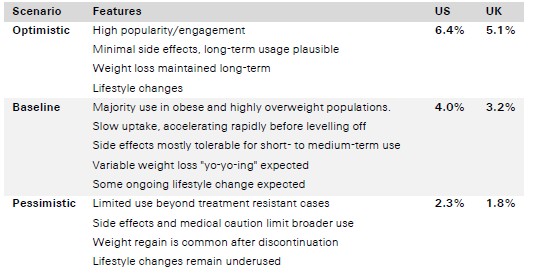The widespread adoption of GLP-1 weight-loss drugs could reduce mortality rates in the coming decades, according to new Swiss Re research. Under optimistic scenarios, Swiss Re projects that GLP-1 medications could reduce all-cause mortality in the United States by as much as 6.4% by 2045. In the United Kingdom, the research suggests a reduction of over 5% is possible.
Paul Murray, Swiss Re's CEO Life & Health Reinsurance, says: "GLP-1 drugs hold significant promise to help us beat the obesity epidemic. Our research underscores that the full benefit will come from going beyond medication. As insurers, we are in a position to build partnerships, support policy and encourage people to make meaningful lifestyle changes with a focus on prevention. If we get this right, we can strengthen the insurance safety net and contribute to people living longer, healthier lives."
Swiss Re's research focuses on the US and UK, where obesity rates are high, and where there has been a strong uptake of these drugs. The US has the developed world's highest obesity rate, at over 40% of adult population. While in the UK, around 30% of adults are obese.
Rising obesity is one factor that has stalled progress in life expectancy across developed markets. In high-income countries, obesity is now linked to 7 of the 10 leading causes of death – including ischemic heart disease, stroke, Alzheimer’s disease and many cancers. By improving baseline risk factors, GLP-1 drugs may contribute to mortality improvements over time, saving millions from premature death.
The report's optimistic scenario depends on a broad uptake of GLP-1 therapies and people adhering to treatment. Most importantly, it will require people implementing lifestyle changes that support long-term health improvements. Without these changes, studies have shown that weight regain and rebound effects are common, with full weight regain possible within a year after patients discontinue these drugs.
Swiss Re's modelling also presents more cautious outcomes. In a pessimistic scenario, there is limited uptake in the population, high discontinuation rates especially due to side effects, and widespread weight regain after treatment finishes. Under these conditions, Swiss Re sees much more limited improvements, with US cumulative mortality reductions of just 2.3%, and 1.8% for the UK by 2045.
Natalie Kelly, Head of L&H Global Underwriting, Claims and R&D at Swiss Re, adds: “GLP-1drugs could be the medical innovation we've been waiting for to reshape mortality trends. The flow-on effect for underwriting assumptions and claims patterns could therefore be significant. It is essential that insurers keep ahead of the GLP-1 evolution, and maintain a robust, evidence-based approach to assessing the risks."
Modelled impact of GLP-1 drugs on all-cause mortality reductions (fewer premature deaths) in the general population by 2045

Swiss Re "The future of metabolic health and weight loss drugs "
|

